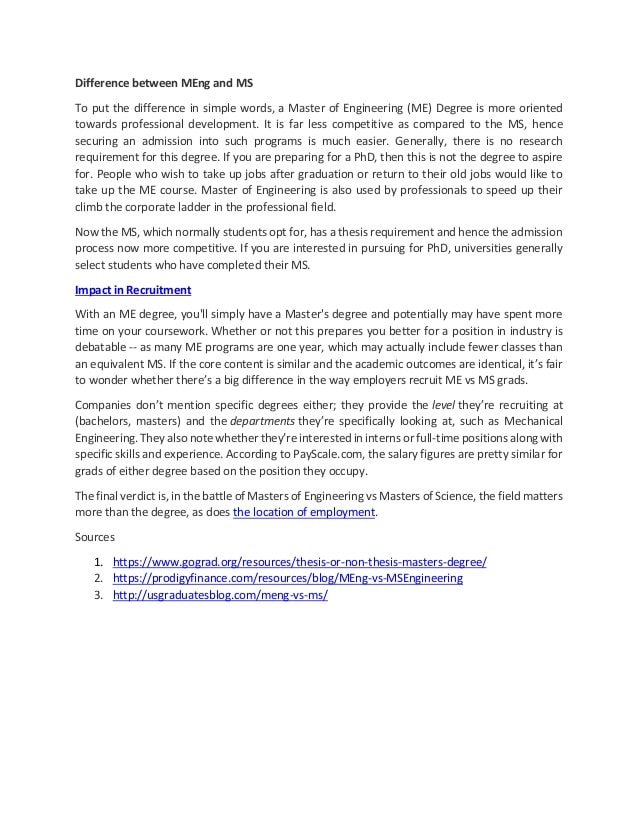When it comes to engineering salaries, what do you think? Both Masters in Engineering and a Masters in Science in Engineering are highly recognised worldwide, so which one should you choose? Both MS degrees and Master of Science in Engineering have similar reputations and are both one of the quickest ways to boost your career and your salary. Which one you choose though will ultimately depend on your interests and your individual circumstances.
Engineering salaries are dependent on a number of different factors which can include location, experience and type of course work. In terms of salary, a Master's Degree in Engineering is likely to be more highly sought after than a Master's in Science in Engineering. One of the main factors for this is that there are fewer applicants applying for a Master's degree in Engineering compared with those wishing for a Masters in Science in Engineering (which has been the traditional route for those seeking higher wages). The number of applicants applying to a Masters in Engineering is usually quite low, as they usually go straight into a business school - although there are always those that want to go further and may go straight into an Engineering course. On the other hand, it may take longer to gain a place on a Management course at university so you may find a salary slightly lower at an Engineering/Business school.
There is a general consensus amongst engineering employers and researchers that graduates with a Masters or equivalent are more skilled and qualified than their Masters in Science in Engineering applicants. This is because the skills gained by obtaining a Masters in Engineering is directly transferable to almost all fields of work. A prospective graduate will be familiar with the latest developments within their chosen field and will already have some relevant industry experience. It is not uncommon for a Masters applicant to find their salary boosted by as much as 40% after a Masters in Science in Engineering is applied. If you were to apply for a job in the automotive industry, for example, your salary would be increased by adding a Masters to your current post.

When you consider the differences between Masters in Engineering and a Masters in Science of Engineering, salaries are often looked at as the only factor to be considered. However, this is not true. Most employers consider the following factors when looking at applicants for a position: Experience, maturity, qualifications and character. It is important to be well versed in all these areas when applying for jobs with salaries that are out of sight.
You will find that engineering professionals are highly regarded when it comes to promotions. Many engineering fields such as Computer-Aided Design (CAD) are highly competitive but the competition does not stop at the level of a Masters Degree. In fact, many engineering fields now offer promotions to employees that have a Masters in Science or equivalents. As technology advances, it is inevitable that more management positions will be required across a number of engineering fields and an education in one of these fields will give you an edge over other applicants.
In addition to an advanced knowledge of technology, many engineers also receive specialized training that will help them perform their job better. In some fields, this is especially critical as precise measurements are required for a variety of purposes, such as airplane manufacture. As a result, engineers that receive specialized training will always stand out from the crowd as the ones receiving the highest salaries. The reason why this is so important is because the very essence of an engineer's job involves being a perfectionist.
Engineering salary figures are never static, regardless of whether you are talking about electrical engineers, civil engineers or structural engineers. In other words, if you want to earn a high salary as an engineer, you need to stay ahead of the curve. This is why a Master of Science or a Master of Arts Degree in Mechanical Engineering can be a helpful benchmark when comparing potential salary figures. A degree in this field will not only help you land higher-paying jobs, but it will also enable you to explore careers in areas like aerospace, bio-technology, power generation, environmental, computer science, mathematics, nanotechnology, as well as a host of others.
While there are certain aspects of mechanical engineering that will always remain unchanged, other fields are constantly changing and evolving. Therefore, you may want to choose a different venue to pursue your studies if you want to keep up with the latest advances in your chosen career. For example, there has been quite a bit of interest generated by the field of applied sciences over the past five years, which has greatly expanded the range of area in which graduates can pursue careers. Therefore, if you have an earned Masters in Science in one of the following areas, you may want to consider re-certifying in order to ensure that you are up to date on the latest advancements in your chosen career.






